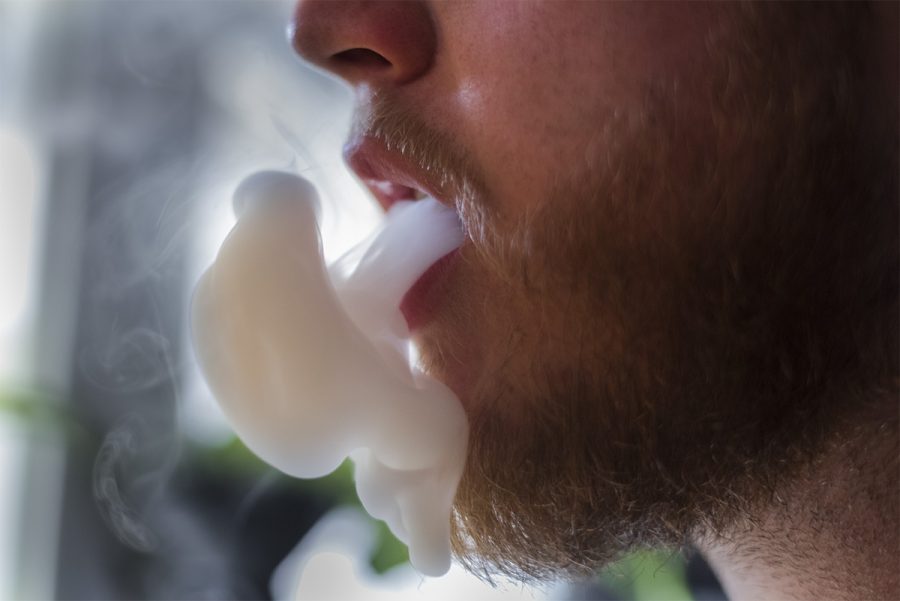Through the vapor
Photo by Taylor Wilkinson
The Eau Claire City-County Health Department has issued a health alert urging members of the community to stop using vape or e-cigarette devices immediately to avoid certain health risks.
The rate of kids vaping in Eau Claire County is higher than the state and national averages, according to a recent article by WQOW.
Last week the Eau Claire City-County Health Department issued a health alert “urging residents to stop using any vaping and/or e-cigarette devices immediately” and to not start if they’ve “never vaped or used e-cigarette devices” before.
This alert also followed confirmation last week that a sixth person died in the United States due to a vaping-related lung illness, as reported by USA Today, raising concerns not only on the statewide scale, but national as well.
However, even considering these growing worries, some individuals like Lucas Larson, a third-year accounting and finance student, said they don’t believe vaping is as dangerous as others view it to be.
“I don’t really see vaping as an issue for anyone anywhere,” Larson said. “It’s far safer than cigarettes.”
Larson said he hasn’t vaped for the past year, but he only stopped because he no longer enjoyed the feeling nicotine gave him. Despite his personal experience with vaping, Larson said the recent deaths associated with vaping don’t concern him at all.
“The people that are getting sick are not using it as it’s intended,” Larson said.
According to ABC News, one such case was recently exposed in Wisconsin, as two brothers were allegedly making “illegal THC-infused vape cartridges,” with THC being the main psychoactive component of cannabis.
The article also explains that authorities are investigating to see if these cartridges with THC oil are connected to the vaping-related deaths.
Similar articles, such as one by USA Today, referenced how in some instances, marijuana that has not passed the state test for contaminants is sold to the black market, which means THC contaminated with pesticides, fungicides and other toxins could be available on the black market and eventually placed in vape cartridges without any regulation.
Katie Wilson, a health educator for Student Health Service, said not knowing what is in these products is a cause for concern.
“The industry has done a great job of saying they’re safer than cigarettes,” Wilson said. “Safer than cigarettes is a very low bar. Safer doesn’t mean safe. There’s such a wide variety of products that it’s difficult to make any blanket statements about safety of any products.”
Regarding the presence of vaping on campus, Wilson said the National College Health Assessment was last administered locally to UW-Eau Claire in the spring of 2018, but only found that 2.3% of students reported using e-cigarettes every day.
“I would expect those numbers to rise,” Wilson said, acknowledging that the survey is conducted every three years.
Heidi Pardon, a fourth-year nursing student, said she has seen many Blugolds vaping on campus over the years.
Frequently witnessing students vaping when walking back and forth from her classes ultimately prompted Pardon to partner with Diane Marcyjanik, an assistant professor of nursing, and pursue research about the dangers of vaping.
“As a nursing student, I see a different side of it,” Pardon said.
With the vaping industry targeting mainly youth, Pardon said she is in the “age range of the (vaping) epidemic” and appreciates that she can talk to students about her research as one of their peers, hoping they can relate to her in that way.
Pardon said based off of the research she and Marcyjanik conducted this past summer, she would warn students that there is still not enough research about the long term effects of vaping.
“Before you’re considering starting this, look at what’s actually inside of them,” Pardon said.
If you or someone you know wants to quit vaping or smoking, Wilson said SHS provides students with coaching and free nicotine replacement products when they make an appointment with SHS. For more information, contact SHS at shs@uwec.edu or 715-836-5360.
Van Sistine can be reached at vansistr6741@uwec.edu.

Ta’Leah Van Sistine is a fourth-year journalism and creative writing student. This is her seventh semester on The Spectator staff. She is spending the semester at Queens College in New York City. When she is not reporting for The Spectator or Blugold Radio Sunday, she enjoys getting lost in a good book or a national park.

